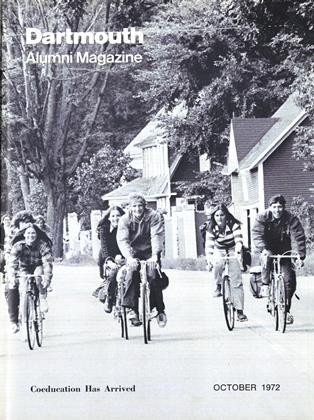TO THE EDITOR:
As you stated in your introductory note to [missing text] Levi's article ("A Valedictorian Changes [missing text] Mind") in the May issue, the '32 class column has been carrying a running dicussion of the thesis of his valedictory address of 40 years ago. One of the points made in that discussion was that the subsequent creation of the Tucker Foundation supported Bill's point that the College of our day had been wanting in its attention to moral values. So Dean Charles Dey '52 of the Tucker Foundation was asked by letter if he cared to comment. Because his reply is in part an interesting and valuable commentary on the Levi article, as well as a useful reiteration of the purpose of the Tucker program, I believe it belongs—providing Doc Dey is amenable—in your correspondence column.
JOSEPH R. BOLDT JR. '32
Dean Dey's letter follows:
DEAR JOE:
The one advantage to procrastination has been opportunity to enjoy Bill Levi's article in the May issue of the Alumni Magazine. [missing text]rudite, closely reasoned, I applaud this scholarly man when he writes, "The success of the liberal university is greatest when it makes its students aware of life and sensitive to the qualities which it offers for their appreciation, when it trains them to understand the works of the mind, to analyze ideas and arguments, weave them together with order and coherence, make sense out of experience." Yet so many young ask, "Make sense out of what experience, to what purpose?" The reality for most college-age students is a minimum of adult experience, by which I mean assuming responsibility within a wide spectrum of human life, where held to account daily. Entering college with high levels of factual awareness and outward sophistication, there is too often lacking the personal context from which to "make sense out of experience." This, I believe, has contributed to the antintellectual drift of the late Sixties.
Moreover, unless one is scholarly by aptitude and appetite—and most young people, even in highly selective universities, are not—"adventure of the intellect" is insufficient. Especially when increasing numbers are so painfully aware of the distance between themselves—their privileges and immunities—and most mortals. A recent graduate who speaks of leaving Dartmouth with unfulfilled needs, comments, "I was Phi Beta Kappa, but so what? I took with me a sense of despair—of war, cities, blacks." Dr. Tucker's response, to him and to those of us who live and learn amidst the young, is best captured in his turn of the century Chapel admonishment: "Do not expect that you will make any lasting or very strong impression on the world through intellectual power without the use of an equal amount of conscience and heart." It is to the preservation of this balance that the Tucker Foundation, which carries his name, is dedicated.
It is difficult to comprehend the extent to which pure academic work may be selfcentered and self-serving, until called upon to give oneself to others in a sustained way. Most Foundation energy and resources are invested in helping young people identify purpose and reason for existence larger than self.
The recent graduate quoted above is one of the roughly forty I am visiting during this sabbatical year, alumni who, during their undergraduate years in the mid to late Sixties, were conspicuous for having involved themselves (from protest to inner city teaching) in issues of conscience. Through this inquiry I am attempting to learn more about questions such as, "How does one reconcile a student's passionate concern for a moral issue with the essentially reflective nature of an academic community?" It has been my hope, thus far encouraged, that their lives subsequently, no less than their retrospective views, would have much to tell us about our work. I regret only that I do not bring to this task the brilliance of a Bill Levi!
Doc DEY '52
Dean Dey has returned to Dartmouth thisfall as head of the Tucker Foundation, aftera year's leave in Washington, D. C., wherean Underwood Fellowship from the Danforth Foundation made possible a study ofissues of conscience in higher education. Heincluded a follow-up study of recent Dartmouth graduates who were involved inTucker Foundation programs as undergraduates.
 View Full Issue
View Full Issue
More From This Issue
-
 Feature
FeatureBetting man's choice: Dartmouth. Then Harvard, Columbia, Cornell
October 1972 -
 Feature
FeatureVerdict on the Dartmouth Institute: A-OK
October 1972 By ROBERT B. GRAHAM '40 -
 Feature
FeatureCoeducation Becomes A Reality
October 1972 By MARY ROSS -
 Feature
FeatureHanover's "Host with the Most"
October 1972 By JAMES L. FARLEY '42 -
 Feature
FeatureHomage to the great god Pigskin: One hundred years of Ivy rivalry
October 1972 -
 Feature
FeatureNew Facilities in the Making
October 1972







